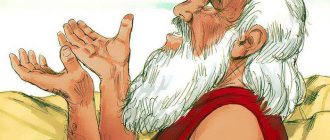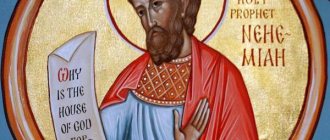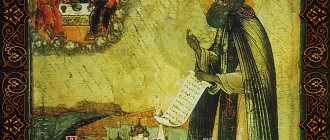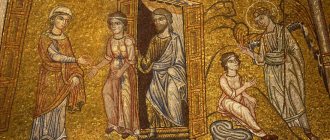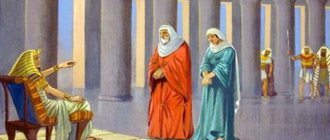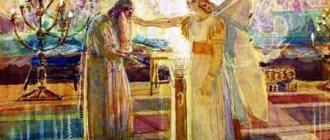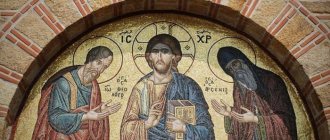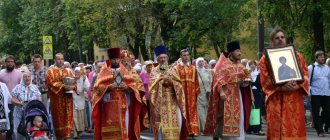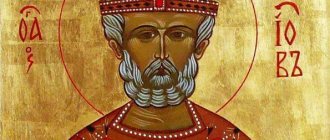Lives of Abraham
Abraham's biography is described in the Book of Genesis. He was born in Mesopotamia, the Chaldean city of Ur approximately 2000 years BC and bore the name Abram. At a young age, he came to the idea of one God and tried to convince his family members to give up idols.
His father, along with his son, daughter-in-law, and grandson, headed to the land of Canaan, but died along the way, in the city of Harran. Abram's wife, Sarai, was his half-sister and had no children.
When Abram was 75 years old, God commanded him to leave with his wife and servants for Canaan, promising to make Abram the ancestor of a great nation, to glorify and bless the Prophet himself, and through him, the entire human race. There was a famine in Canaan, and Abram headed to Egypt. Sarah was a beautiful woman. Fearing that he would be persecuted because of his wife, Abram began calling her his sister. Sarah ended up in Pharaoh's harem, but God punished Pharaoh and his family for this, after which Sarah was released back to her husband.
Abram and Sarah went to the land of Canaan, and Lot went to the city of Sodom. Arriving in Canaan, he began to lament that he was old and had no heir. God again confirmed that he would give him a son, and his descendants would possess the land of Canaan. Soon news came that Sodom was attacked by foreign troops and the inhabitants of the city, including Lot, were captured. Abram armed his slaves, went in pursuit and recaptured the captives and captured property. He did not want to take anything as a reward.
God again confirmed to Abram that from his root there would come a multitude of people who would live from Egypt to the Euphrates. To fulfill the promise, Abram was ordered to sacrifice one unit of three-year-old livestock (a cow, a goat and a ram), as well as a dove and a turtle dove. But Sarah remained barren and gave her slave Hagar to her husband as a concubine.
Hagar became pregnant by Abram and became arrogant towards Sarai. Sarah complained to her husband, and he did not stand up for the concubine. Hagar fled into the desert for fear of punishment from her mistress. In the desert, she met an angel who conveyed God’s command to return back and name the born baby Ismail.
13 years have passed. Abram turned 99 and Sarah turned 90. God appeared to Abram and repeated his words again, but set a condition: to circumcise all males, including 8-day-old babies. Abram was named Abraham, and Sarai was named Sarah. Soon Abraham, sitting at the tent, saw 3 travelers, in whose form God appeared to him. He washed their feet and treated them to the best food.
God said that He would appear in a year when Sarah gave birth to a son, who should be named Isaac. God instructed Abraham to verify the sinfulness of the inhabitants of Sodom and Gomorrah and predicted their destruction. Abraham stood up for sinners so that they would be pardoned if 10 people among the townspeople remained righteous. Sodom and Gomorrah were destroyed.
Sarah gave birth to a son named Isaac. Ismail, who was 14 years older, mocked the child. Hagar, together with her son, with the consent of God, was expelled from the house. After several years, God decided to test Abraham's faith and ordered Isaac to be sacrificed. The righteous man, without hesitation or grumbling, prepared to fulfill the command of the Lord, but at the last moment he was stopped by an angel, a messenger of God.
Sarah died when she was 127 years old. Her place of rest was a cave near Hebron. After her death, Abraham had 6 sons from his concubine. Isaac became the ancestor of the Jews, the other sons became the ancestors of the Arab tribes. Abraham died at the age of 175 and was buried next to Sarah.
Foundation of Jacob's family
Jacob's family became the center of God's providence. Jacob had 12 sons, the first ten born from three women - Leah, Leah's maid and Rachel's maid. The two youngest sons, Benjamin and Joseph, were born from Rachel. These 12 sons formed the 12 tribes of Israel - the people chosen by God to become the country that would receive the True Parents.
The spiritual, “Abelian” attitude to life was adopted from Jacob by his penultimate son Joseph. Joseph's brothers were jealous of his position as the favorite son and sold him into slavery in Egypt. There Joseph achieved prosperity and became the chief nobleman of Pharaoh. Having overcome the temptations of the fallen world of Egypt, especially the temptations of women, Joseph established himself as Abel in the second generation of Jacob's family.
When famine began in his homeland, Joseph's brothers arrived in Egypt to buy grain. Joseph recognized them and, despite the cruelty they had shown him earlier, received them with love, gave them grain and returned the money they had paid for that grain. The brothers could not understand such generosity, but when they arrived again in Egypt to buy grain, Joseph revealed himself to them. The brothers, reunited, cried with joy.
Joseph acted wisely to win over his brothers and father, much as his father had done to win the love of Esau. By giving gifts to his brothers, he showed them that he loved them, despite the harm they had caused him in the past. They, for their part, were ready to repent and ask for forgiveness for what they had done. As a result of the restoration of the relationship between Cain and Abel in Jacob's family, the personal basis for the emergence of True Parents created by Jacob reached the family level through his sons.
Meaning
Abraham was the harbinger of the birth and spread of Christianity. He is the herald of monotheism, for which he was blessed by God. His descendants became the ancestors of all nations according to the promise of the Lord. The righteous man was an example for other people by his faith. The name of the prophet was used to confirm Christian dogmas and spread the doctrine.
In Christian theology
Patriarch Abraham is a righteous man, obedient to the will of God. Christian theologians wrote about the meaning of the image of the Old Testament prophet: John Chrysostom (preacher of monotheism and faithful servant of the Lord), Augustine the Blessed (the forefather of all nations according to the promise of the Lord).
Other writings of the church fathers place events described in the Old Testament in the context of proving the existence of God, for example:
- bread and wine presented to Abraham - as a prototype of the Eucharist;
- the voice that stopped the sacrifice of Isaac - as proof of the existence of the Holy Spirit;
- readiness to sacrifice Isaac - as a harbinger of Golgotha and the way of the cross of Jesus.
The Gospel mentions that in a dispute with the Pharisees, Jesus recognized them as physical, but not spiritual, heirs of the righteous man.
In the light of the New Testament
Abraham and Moses are the Old Testament prophets most often referred to in the New Testament. Jesus is a descendant of Abraham. As evidence of his dual essence (God in human form), the New Testament cites the words of Jesus: “Before Abraham was, I am” (John 8.58).
The Gospel of Luke conveys the words of Jesus, who entered the house of the tax collector Zacchaeus, that a repentant sinner will be saved because he, too, is the son of Abraham. John the Baptist and the Apostle Paul urge Christian converts to repent of their sins to avoid the wrath of God. Being a descendant of Abraham does not mean receiving forgiveness from the Lord.
Substantial basis
According to the principles of creation, humans occupy a central position in creation, and all other creatures are created as objects for humans. Therefore, the Servant, created before Adam, had to obey Adam and receive God's blessings through Adam. As a result of the Fall, the Servant received unrighteous power over Adam through Eve. Because of this change of position in creation, God could not bless either Adam or the Servant. To bless them when they violated the principles of creation would be to recognize the unprincipled relationship as being in accordance with the Principle and to endow it with eternal value.
According to the principles of restoration, the relationship between Adam and the Servant must be restored to its original state, which is possible if the representative of the Servant voluntarily submits to the representative of Adam. According to the model of restoration established in Adam's family, the eldest son is chosen as the representative of the Servant, and the younger son is chosen as the representative of Adam. Once the relationship between Adam and the Servant is corrected by Cain submitting to Abel's love, a substantial foundation will be created and Cain and Abel will be able to receive God's blessing.
If Abraham himself had created the foundation of faith, then his sons, Ishmael and Isaac, would have been responsible for restoring the relationship between Cain and Abel and would have created the substantial foundation. If successful, both sons would have received God's blessing, but because of Abraham's mistake in the first sacrifice, Isaac took over from Abraham the position of the father of faith, and his two sons, Esau and Jacob, took over the position of Ishmael and Isaac (Cain and Abel) .
Biblical criticism
The sacred book of the Jews, the Tanakh (Old Testament), has existed unchanged for about 3,000 years. Criticism of the first part of the Bible has existed for the same amount of time. In relation to Abraham, this is a skeptical attitude towards the words of the Lord, who promised:
- to make from him a great nation;
- magnify his name;
- through him to bless other nations.
The descendants of the righteous man became the ancestors of the Jews, Arabs and other peoples who preserved the name of their ancestor for thousands of years. No other person in earth's history has such fame. The Jews are a great people because they were marked by God, and the whole world knows about it.
Abraham, in anticipation of the fulfillment of these promises, grumbled and cried out to the Lord. God told him again and again that he would have an heir, and his descendants would be as many as the stars in the sky. Abraham believed God, and for this he became righteous. Faith is the main thing that matters to God. People try to gain righteousness by works, forgetting about faith.
Iconography
The image of Abraham is used in five iconographic storylines taken from biblical stories. On icons the righteous man is depicted as a gray-haired old man. One of the most common images is dedicated to the Old Testament Trinity. The icon depicts three angels, symbolizing the three hypostases of God, and Abraham. The basis of the plot is the appearance of the Lord to the righteous in the form of three travelers, in whom he recognized God.
Other scenes with the image of the righteous:
- son sacrifice;
- as the forefather of nations;
- with a scroll in his hands.
Early Christian icons show Abraham up to his waist or chest. In later iconography there are images depicting the two main Old Testament prophets: Moses and Abraham.
Jacob's chosen race
When Jacob and Esau restored the relationship between Cain and Abel, they laid the foundation for the first True Parents in history. God chose the descendants of Jacob who became the 12 tribes of Israel, a people called to create a country in which the Messiah would appear. When Tamar restored the purity of Eve's womb, God chose the race of Judah to be the birthplace of the Messiah. Thus, the family of Abraham, and the line of Jacob in particular, became the starting point for expanding the boundaries of the providence of restoration from the individual to the family, the tribe, and ultimately the country ready to receive True Parents. Thus the children of Israel became the chosen people.
Abraham in Judaism
In ancient Jewish written sources (mildrash), Abraham is the first of the people to realize that God is one and to reject paganism. He became the first preacher of monotheism and a fighter against idolatry. According to the mildrash version, the site of Isaac's supposed sacrifice was the Temple Mount in Jerusalem. King Solomon erected a temple (where the name of the mountain came from) on the site of the altar of burning his son.
Abraham is considered the author of the book Sefer Yetzirah, the primary source of Kabbalah, a religious movement in Judaism.
Abraham in the Islamic tradition
In Islam, Abraham is identical to the prophet and preacher of Allah, Ibrahim. The proof is provided by biographical coincidences set forth in the Koran and the Old Testament. Ibrahim was a Hanif. Hanifism prepared the way for the emergence and spread of Islam in the Arabian Peninsula.
Ibrahim's eldest son, Ismail, is considered the ancestor of the Arabs and the ancestor of Muhammad. The youngest, Ishak, is the ancestor of the Jewish tribe. The Tomb of Ibrahim is one of the most revered Muslim shrines, located in Hebron (Palestine).
